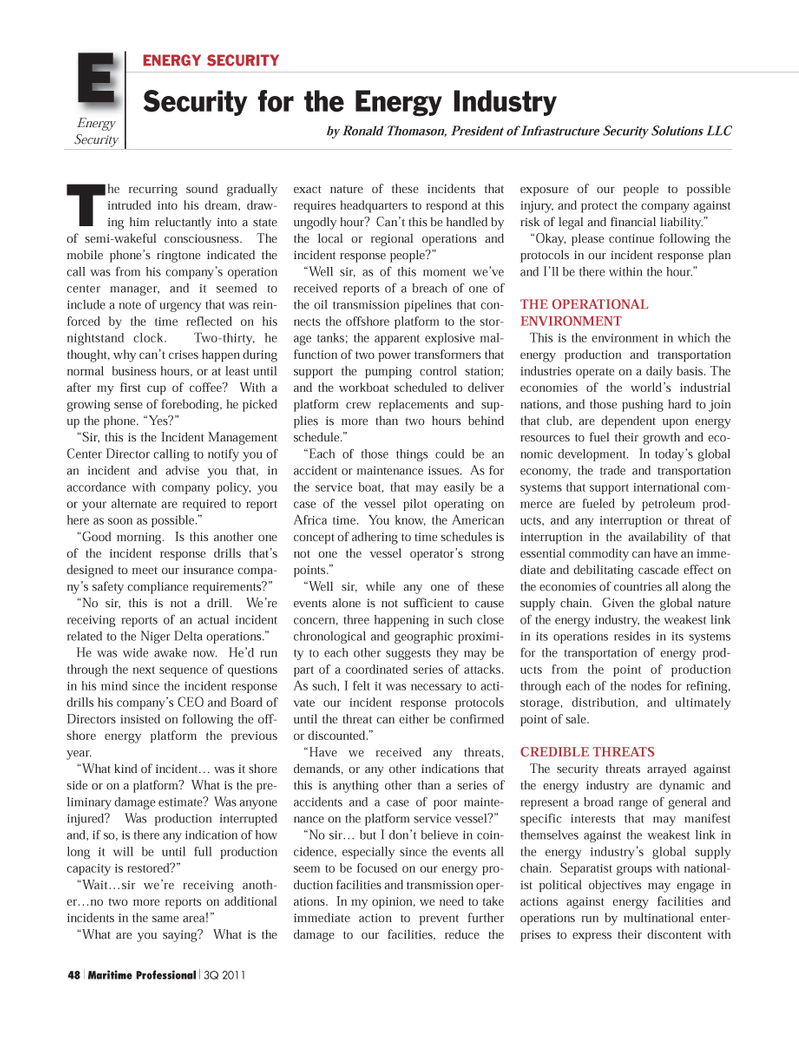
Page 48: of Maritime Logistics Professional Magazine (Q3 2011)
Maritime Security / Maritime Training & Education
Read this page in Pdf, Flash or Html5 edition of Q3 2011 Maritime Logistics Professional Magazine
48 Maritime Professional 3Q 2011EEnergy SecuritySecurity for the Energy Industry by Ronald Thomason, President of Infrastructure Security Solutions LLCENERGY SECURITYThe recurring sound graduallyintruded into his dream, draw- ing him reluctantly into a stateof semi-wakeful consciousness. The mobile phone?s ringtone indicated the call was from his company?s operation center manager, and it seemed to include a note of urgency that was rein- forced by the time reflected on hisnightstand clock. Two-thirty, he thought, why can?t crises happen during normal business hours, or at least until after my first cup of coffee? With a growing sense of foreboding, he picked up the phone. ?Yes?? ?Sir, this is the Incident Management Center Director calling to notify you ofan incident and advise you that, inaccordance with company policy, you or your alternate are required to reporthere as soon as possible.? ?Good morning. Is this another oneof the incident response drills that?s designed to meet our insurance compa-ny?s safety compliance requirements?? ?No sir, this is not a drill. We?re receiving reports of an actual incident related to the Niger Delta operations.? He was wide awake now. He?d run through the next sequence of questions in his mind since the incident responsedrills his company?s CEO and Board of Directors insisted on following the off- shore energy platform the previous year. ?What kind of incident? was it shore side or on a platform? What is the pre- liminary damage estimate? Was anyone injured? Was production interrupted and, if so, is there any indication of how long it will be until full productioncapacity is restored?? ?Wait?sir we?re receiving anoth- er?no two more reports on additional incidents in the same area!??What are you saying? What is the exact nature of these incidents that requires headquarters to respond at thisungodly hour? Can?t this be handled by the local or regional operations and incident response people?? ?Well sir, as of this moment we?ve received reports of a breach of one of the oil transmission pipelines that con-nects the offshore platform to the stor- age tanks; the apparent explosive mal- function of two power transformers that support the pumping control station;and the workboat scheduled to deliver platform crew replacements and sup- plies is more than two hours behind schedule.? ?Each of those things could be anaccident or maintenance issues. As for the service boat, that may easily be acase of the vessel pilot operating on Africa time. You know, the American concept of adhering to time schedules isnot one the vessel operator?s strong points.? ?Well sir, while any one of these events alone is not sufficient to cause concern, three happening in such closechronological and geographic proximi-ty to each other suggests they may be part of a coordinated series of attacks.As such, I felt it was necessary to acti- vate our incident response protocols until the threat can either be confirmed or discounted.? ?Have we received any threats, demands, or any other indications that this is anything other than a series of accidents and a case of poor mainte-nance on the platform service vessel?? ?No sir? but I don?t believe in coin- cidence, especially since the events all seem to be focused on our energy pro- duction facilities and transmission oper- ations. In my opinion, we need to take immediate action to prevent further damage to our facilities, reduce the exposure of our people to possible injury, and protect the company against risk of legal and financial liability.? ?Okay, please continue following the protocols in our incident response planand I?ll be there within the hour.? THE OPERATIONAL ENVIRONMENTThis is the environment in which the energy production and transportationindustries operate on a daily basis. The economies of the world?s industrial nations, and those pushing hard to jointhat club, are dependent upon energy resources to fuel their growth and eco- nomic development. In today?s global economy, the trade and transportation systems that support international com-merce are fueled by petroleum prod-ucts, and any interruption or threat of interruption in the availability of that essential commodity can have an imme- diate and debilitating cascade effect on the economies of countries all along thesupply chain. Given the global nature of the energy industry, the weakest link in its operations resides in its systemsfor the transportation of energy prod- ucts from the point of productionthrough each of the nodes for refining, storage, distribution, and ultimately point of sale. CREDIBLE THREATS The security threats arrayed againstthe energy industry are dynamic andrepresent a broad range of general andspecific interests that may manifest themselves against the weakest link in the energy industry?s global supply chain. Separatist groups with national-ist political objectives may engage in actions against energy facilities and operations run by multinational enter-prises to express their discontent with MP #3 (34-49):MP Layouts 8/17/2011 4:31 PM Page 48

 47
47

 49
49
